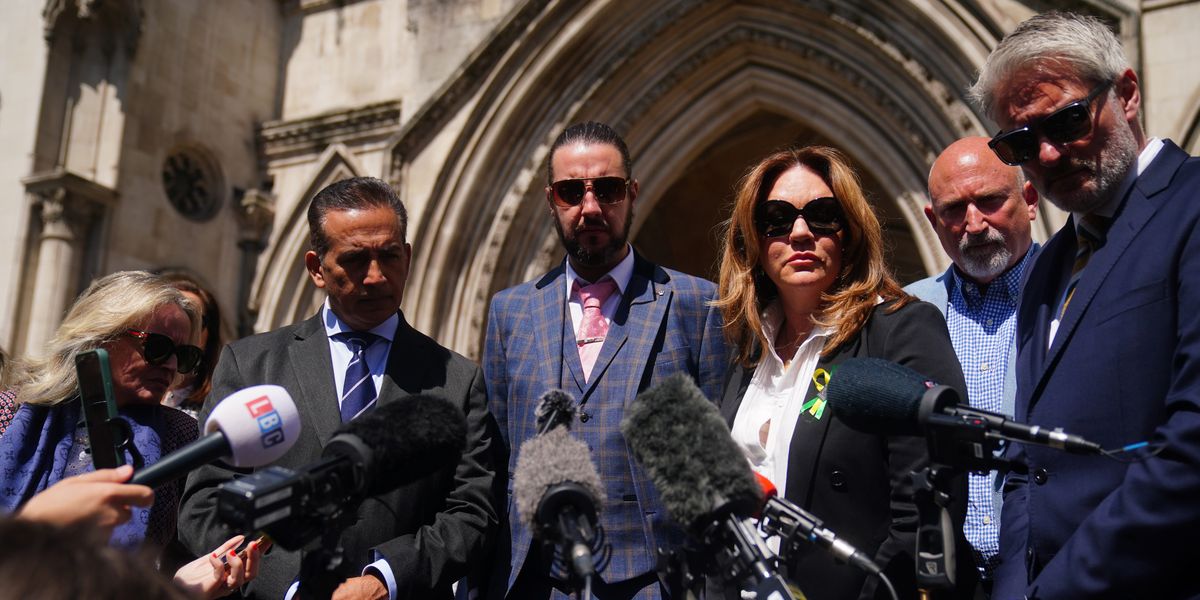Fresh calls for a public inquiry have been made by the families of three people who were killed in a knife attack in Nottingham last year.
The families of Barnaby Webber, Grace O’Malley Kumar, and Ian Coates, were at the Court of Appeal for Valdo Calocane’s sentence review before three senior judges.
Attorney General, Victoria Prentice KC MP, submitted the case to the Royal Courts of Justice claiming it to be “unduly lenient” after an outcry from the public.
Speaking in front of the court, Emma Webber, mother of victim Barnaby, said: “We believe the system is flawed in the investigations and prosecution.”
(Left-right) Dr Sinead O’Malley and Dr Sanjoy Kumar, parents of Grace O’Malley-Kumar, James Coates, son of Ian Coates, and Emma and David Webber, parents of Barnaby Webber, speak to the media outside the Royal Courts of Justice in London following the hearing of Nottingham killer Valdo Calocane over whether his sentence is ‘unduly lenient.’
PA
Dr Sanioy Kumar, father of victim Grace, said “It is very hard for us to go through this process when all we should be doing is grieving for our children.”
“We robustly ask for a public enquiry,” he said.
James Coates, son of Ian, said: “We’ve been let down and failed by almost everyone in the process. There has to be change.”
Calocane was sentenced to an indefinite Hospital Order under the Mental Health Act in January after the Crown Prosecution Service accepted guilty pleas of manslaughter under the grounds of diminished responsibility.
He was originally charged with murder, but because of his condition, paranoid schizophrenia, was allowed to plead guilty to manslaughter.
LATEST DEVELOPMENTS:
Ian Coates, Barnaby Webber and Grace O’Malley-Kumar
PA
It is argued he should have been sentenced to a hybrid order, meaning he would serve a custodial sentence after finishing his treatment at Ashworth Hospital.
Thirty-two-year-old Calocane, who appeared by video link from an armchair in an empty, yellow room with blue curtains, raised his hand to confirm his identity.
Deanna Heer KC, representing the Attorney General’s Office, said Calocane’s “culpability was not extinguished, only reduced” when he attacked his victims.
She said: “The exceptional level of seriousness of the offences was such that the case required the imposition of a sentence with a penal element, an element of punishment.”
Defence barrister, Peter Joyce KC, representing Calocane, said “Any planning took place under the influence of psychosis. But for the psychosis, none of the offence would have committed.”
He added that: “Moral culpability was at the very bottom of the scale.”
Valdo Calocane, who shares dual Portuguese and Guinea-Bissau heritage, was formally diagnosed with schizophrenia in 2020.
During the period between developing the condition and the killings, Calocane had repeated encounters with police and had stopped taking medication.
The Lady Chief Justice Baroness Carr said the hearing was “short but effective”.
She reserved judgement for 7 days time when a short oral statement will be delivered in court revealing the outcome of the review.
Calocane stabbed the two students, Grace and Barnaby, before killing Ian with the same knife and stealing his van which he used to attempt to murder three others on June 13 in Nottingham.

